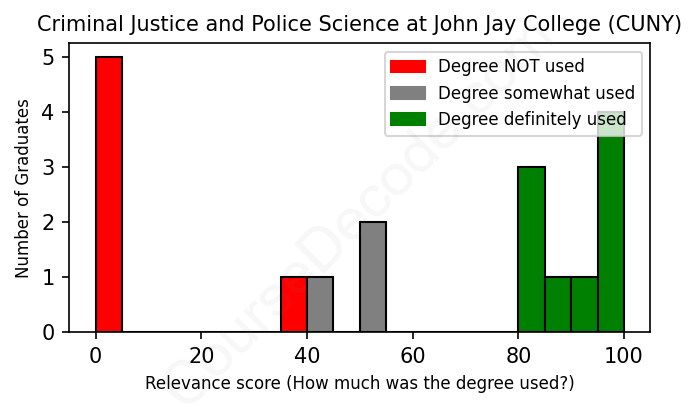
First, some facts. Of the Criminal Justice and Police Science graduates from John Jay College (CUNY) we've analyzed , here's how many have used (or NOT used) their degree in their career:

These are estimates based on AI analysis of 18 LinkedIn profiles (see below).
The verdict? Significantly below average. Overall, with an average relevance score of 55%, Criminal Justice and Police Science graduates from John Jay College (CUNY) have a much lower likelihood (-12%) of finding work in this field compared to the average graduate across all fields:
And for comparison, here's the chart for all profiles we've looked at across all degrees.
Also, after graduating, only 33% of these graduates have pursued further education other than another Bachelor's degree (such as a Masters degree or other), compared to the average across all profiles of 35%. This suggests a Bachelors degree is enough for most Criminal Justice and Police Science graduates, and it's normal to look for work straight after graduation.
See the details:
|
Relevance score: 100% We think this person has gone into a career highly relevant to their degree. We think this person has gone into a career highly relevant to their degree.
DEGREE INFOGraduated in 2019 from John Jay College (CUNY) with a Bachelor's degree in Criminal Justice and Police Science. No other secondary education since. JOB HISTORY SINCE GRADUATIONLegal Assistant Susan H. Sapiro Attorney at Law Mar 2021 - Dec 2021 Paralegal  Wilson Elser Jan 2022 - Aug 2023 Litigation Paralegal  Beldock & Saunders, PC Aug 2023 - Jan 2024 ABOUTAs a litigation paralegal with expertise in the hospitality industry, I have successfully supported multiple attorneys in preparing and handling complex cases, ranging from personal injury to employment disputes. I have demonstrated strong communication skills, both written and oral, in drafting and reviewing legal documents, conducting research and interviews, and communicating with clients, witnesses, and experts.I have also proven my ability to work under pressure and adapt to changing deadlines and priorities, as evidenced by my recent experience at Wilson Elser, where I handled a high-volume caseload and assisted in securing favorable outcomes for several clients. In addition, I have enhanced my organization skills, attention to detail, and problem-solving abilities, by managing and maintaining files, calendars, and databases, as well as resolving any issues that arose during the litigation process. My goal is to continue to learn and grow as a paralegal, and to contribute to the success of the legal team and the satisfaction of the clients. |
The top 10 most common jobs done by the graduates we've analyzed (ranked most common to least) are:
When we look at the career paths of people who graduated with a degree in Criminal Justice and Police Science from John Jay College, it seems there's a mix of roles that are really relevant to the field and others that totally miss the mark. Many graduates have taken on positions like Corrections Officers, Police Sergeants, and roles within law enforcement agencies, which definitely use skills and knowledge from their studies. These roles give them a chance to apply their understanding of criminal justice principles firsthand, making them a great fit for those looking to make a direct impact in the field.
However, not all graduates ended up in roles that align with their degree. A good number took jobs in unrelated sectors, like retail management, technician roles, or even administration, which don't really require any specific criminal justice knowledge. Even some positions that involve oversight or supervision in security firms don’t always tap deep into what those students learned about criminal justice. So, while there are some clear success stories that dive right into law enforcement or supportive legal roles, there’s also a fair share of graduates whose jobs veer away from their field of study, like into business management or social work, which, while relevant in some ways, doesn’t fully utilize the depth of their criminal justice education. Overall, it’s a mixed bag, reflecting the diverse paths people can take after graduation.
Here is a visual representation of the most common words in job titles for Criminal Justice and Police Science graduates (this is across all Criminal Justice and Police Science graduates we've analyzed, not just those who went to John Jay College (CUNY)):

Graduates from John Jay College with degrees in Criminal Justice and Police Science seem to follow a range of career paths, with many starting off in security or law enforcement roles shortly after graduation. For instance, recent alumni have found themselves working as corrections officers, police sergeants, or in various positions within security services. These initial roles often set the foundation for more advanced positions in criminal justice or related fields within five to ten years. Some have even transitioned into higher management roles, while others have pursued unique paths, such as founding their own companies or moving into positions with international organizations.
However, it's also true that not all graduates stick closely to traditional criminal justice careers. Many have veered into related fields like social work, cybersecurity, or even corporate management. Some have taken on roles in seemingly unrelated sectors, such as hospitality or administrative positions, which might reflect a broader job market trend or personal interests that develop after graduation. Overall, while you can find plenty of success stories in law enforcement and criminal justice, there’s a considerable number of graduates who explore diverse career opportunities outside this realm, making their career trajectories quite varied.
Honestly, a Bachelor's degree in Criminal Justice and Police Science, especially at a place like John Jay College, can be a mix of challenging and manageable. It's definitely not the easiest degree out there because it covers a lot of ground—think law, ethics, sociology, and a bunch of theories around crime and justice. You'll have to deal with some heavy reading, writing papers, and understanding complex legal concepts. But if you’re into the subject and stay organized, it’s totally doable. A lot of students find it interesting and can connect the material to real-life situations, which makes the work feel a bit easier. Overall, it might be a bit harder than average, but with the right mindset, you can tackle it!
Most commonly, in the LinkedIn profiles we've looked at, it takes people 4 years to finish a Bachelor degree in Criminal Justice and Police Science.
Looking at the job history of these John Jay College grads, it seems like they’ve landed some decent gigs overall, especially considering many are working in law enforcement or security-related fields, which can be pretty stable and often pays well once you're established. For instance, those who moved quickly into managerial roles, like the general manager at Congress Motors or the police sergeant, are likely making a solid income. Others who started out in internships or lower-level positions have worked their way up, which is key in any field when it comes to salaries. Some, like the guys involved with the UN or those in corporate roles, probably see a healthy paycheck too. Sure, not everyone is in high-paying fields, especially with some working as social workers or in education, but overall it looks like many are doing pretty well. It’s all about building experience and moving up that ladder!
Here is a visual representation of the most common words seen in the "about" section of LinkedIn profiles who have a Bachelor degree in Criminal Justice and Police Science (this is across all Criminal Justice and Police Science graduates we've analyzed, not just those who went to John Jay College (CUNY)). This may or may not be useful:

Here are all colleges offering a Bachelor degree in Criminal Justice and Police Science (ordered by the average relevance score of their Criminal Justice and Police Science graduates, best to worst) where we have analyzed at least 10 of their graduates:
| College | Score | Count |
|---|---|---|
 John Jay College (CUNY) John Jay College (CUNY)
|
55 | 18 |